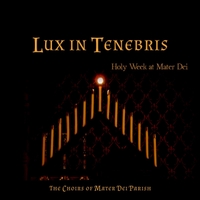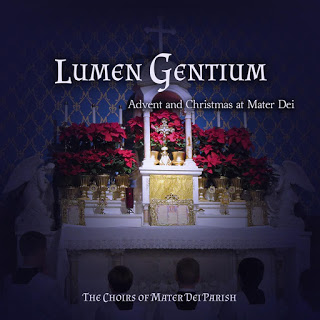Background Concerning the Great Apostasy
Among the precursors to the coming of the antichrist are the preaching of the Gospel throughout the entire world and an event known as the Great Apostasy. In an earlier post about how the movements of the Missal during Mass are symbolic, we recalled that near the end of the world, the Gentiles would reject Christ, and the Jews would ultimately accept Him. The great repudiation of the Faith among the Gentiles is called the Great Apostasy.
Are we living during the Great Apostasy? Perhaps. It is possible that the Gospel has been preached throughout the entire world. Likewise, the current resurgence in neopaganism is startling. If this is not the Great Apostasy, then it is surely a foreshadowing of it. If this is not the Great Apostasy, I would hate to think how much greater the Great Apostasy would be.
Why speak of the Great Apostasy now with Christmas just around the corner? Because Advent is a two-fold preparation. It is a preparation for the historical birth of Christ, His first coming. It is a preparation to receive the Child Jesus in our hearts. It is also a preparation for the future second coming of Christ at the end of the world. In light (or is that darkness?) of the pagan and hedonistic renewal we see today, it might be of interest to consider what has happened to Christmas in this time of apostasy.
What do we see happening to Christmas today?
Christmas has been transformed
When Christmas comes around, what are the symbols presented to our eyes from day to day? Most often we see Santa Clause enjoying a Coke, Rudolph the Red Nosed Reindeer, the Abominable Snowman, snow flakes (the folks in Buffalo NY must be sick of seeing snow flakes), candy canes, and–except at a few stores like Hobby Lobby–maybe a manger scene. There is an outlandish satanic “Christmas” display this year in Miami, but it is perhaps less insidious than the more benign characters used to divert us from the true meaning of Christmas.
It wasn’t that long ago when you would hear songs easily associated with the birth of Christ. Anymore, you’re lucky to hear White Christmas or Chestnuts Roasting on an Open Fire which are at least “traditional” in the sense that they have something to do with music about the weather in the Northern Hemisphere at the time of year during which Christmas falls. These days, it’s Jingle Bell Rock, Rocking Around the Christmas Tree, or some other nonsense like I Want a Hippopotamus for Christmas blaring over the speaker system.
Christmas has been supplanted
More often than not, the greeting “Merry Christmas” has been replaced by “Happy Holidays” or “Season’s Greetings”. This modification, supposedly, is in order not to offend anyone’s sensibilities (except for the sensibilities of Christians, which are of no apparent import). Not offending anyone is just a convenient excuse, of course. The change has had it’s effect, however. Some stores no longer sell Christmas trees at all. They sell “holiday trees”. Don’t be fooled! These counterfeit imitations look virtually identical to the real mccoy.
Let us consider how ridiculous it is to wish someone “Happy Holidays”. Which holidays (other than Christmas) are there at this time of year? Hanukkah and Kwanzaa, we are told. Of these, Hanukkah could be considered a holy day (holiday)–at least it was while Judaism was the true faith prior to the rejection of Christ.
Consider Hanukkah
So, when we are told “Happy Holidays” by the greeter at Walmart, is it because the greeter is unsure whether we celebrate Christmas or Hanukkah? What is Hanukkah? Is there a tradition of giving gifts at Hanukkah? How long does Hanukkah last? Interestingly, Better Homes and Gardens sheds some light. (Better Homes and Gardens?!?) Alright, BHG may not be the best source, but it does have this to say:
In the U.S., where Santa Claus rules the month of December, some Jews have incorporated a little bit of Christmas into their Hanukkah spirit. Some families opt to give gifts each night of Hanukkah; others may decorate their house with a “Hanukkah bush.” Even though the two holidays have vastly different religious and historical origins and focus, both Christmas and Hanukkah are a beautiful opportunity to open up one’s house and heart and spread some joy.
Note that BHG admits that giving gifts is “incorporating a little bit of Christmas into their Hanukkah spirit” [emphasis mine].
So no, there is no tradition of giving gifts at Hanukkah. That is a Christmas tradition. If you are at Walmart buying gifts at this time of year, presumably you are buying Christmas gifts. Furthermore, the date of Hanukkah floats around. This year it is from Dec. 16 – 24. In 2015, it will be from Dec. 6 until Dec. 14. So next year, on Dec. 15, will the greeters at Walmart suddenly shift from “Happy Holidays” to “Merry Christmas?” Don’t bet on it.
No. There is something more insidious going on than a simple mistake about which holy day we celebrate in December.
Consider Kwanzaa
From Wikipedia:
Kwanzaa is a week-long celebration held in the United States and also celebrated in the Western African Diaspora in other nations of the Americas. The celebration honors African heritage in African-American culture, and is observed from December 26 to January 1, culminating in a feast and gift-giving.[1] Kwanzaa has seven core principles (Nguzo Saba). It was created by Maulana Karenga, and was first celebrated in 1966–67.
Why am I not surprised this “Holiday” was invented in the 1960s? But I digress. The point is that Kwanzaa is a nationalistic or cultural celebration, not a holy day. It is not even a national “holiday” in the U.S. (such as Independence Day). Sorry, but the greeter at Walmart (or rather the person directing him to say “Happy Holidays”) is not confused about whether you celebrate Christmas or Kwanzaa.
What possible holiday is left?
Consider the Immaculate Conception
I just had to throw this in. Is it possible that, it being only the 5th of December, the astute greeters at Walmart, having determined you are Catholic, wonder if you are there to buy gifts for Christmas or the Feast of the Immaculate Conception (Dec. 8)? In their scrupulosity, they decide to wish you a “Happy Holidays” just in case. It would at least be another holy day in December. Okay, I’m being facetious.
The fact is that “Happy Holidays” is simply a slap in the face of Christ, a way to divert attention from the real holy day of Christmas.
Christmas has been commercialized
We’ve known of the over-commercialization of Christmas since at least the time of Charlie Brown. Well, turning Christmas into a season of materialism is nothing new. Incidentally, I am not opposed to giving gifts at Christmas, so long as they are giving in honor of Christ, Emmanuel, God with Us, the perfect gift of the Father to man. These days, stores look to Christmas to try to stay in the black. We just recently celebrated Black Friday and its external solemnity, Cyber Monday. (Today is the octave day of Black Friday, if you were interested in knowing.) The commercialism of Christmas is so obvious, I think I’ll just leave it at that.
The times and Duration of Christmas have been changed
As Charlie Brown’s little sister Sally reminds us, “Christmas is about getting all you can get while the getting is good.” On that marvelous day, December 25, we wake up and dash to the living room to see what wonderful things Santa Claus has left for us, taking pause briefly to ponder the mystery of how it all got down the chimney. The next day, December 26, is the biggest return day of the year for retail. On December 26, Christmas is over. But when did Christmas start? It depends from store to store–anywhere from July to November. That’s the Christmas season, right?
Well, no. Christmas begins on December 25 and extends five weeks (it is longer than Advent) culminating on February 2 with Candlemas. (On Candlemas, incidentally, the world is busy buying chocolate and flowers for Valentine’s day. But I digress again.)
What has this to do with the Great Apostasy?
I submit that the adulteration of the Christmas season is but a symptom of neopaganism, which has been allowed in our culture due to the fact that many Christians have lost the Faith. In the Great Apostasy, surely Christmas will have at least as bad a fate as it has been given by this faithless generation.





I propose to you the great apostasy started long ago, and Christmas has always been a part of the great falling away because it is, in and of it self, a Christianised take on Saturnalia and idolatry. The easiest way to present the truth about where Christmas came from and what it’s truly all about is to provide you with a video link for you to research the information within it both historically and scripturally. [Link removed by editor.]
You cannot take what God calls an abomination and redefine it as holy for God. Yes, the Messiah was born as fully man and fully God, He lived a sinless life yet died on behalf of the sins of mankind, and He is risen to redeem those who are His. That never has been what Christmas is or was about. I pray God opens your eyes with the scriptures and the history shared in the video.
Shalom shalom
The Church, which Jesus Himself founded, tells me to celebrate the birth of Jesus on December 25, Christmas Day (Christ’s Mass). Am I going to listen to the Church Jesus Christ founded or to Jim Staley?